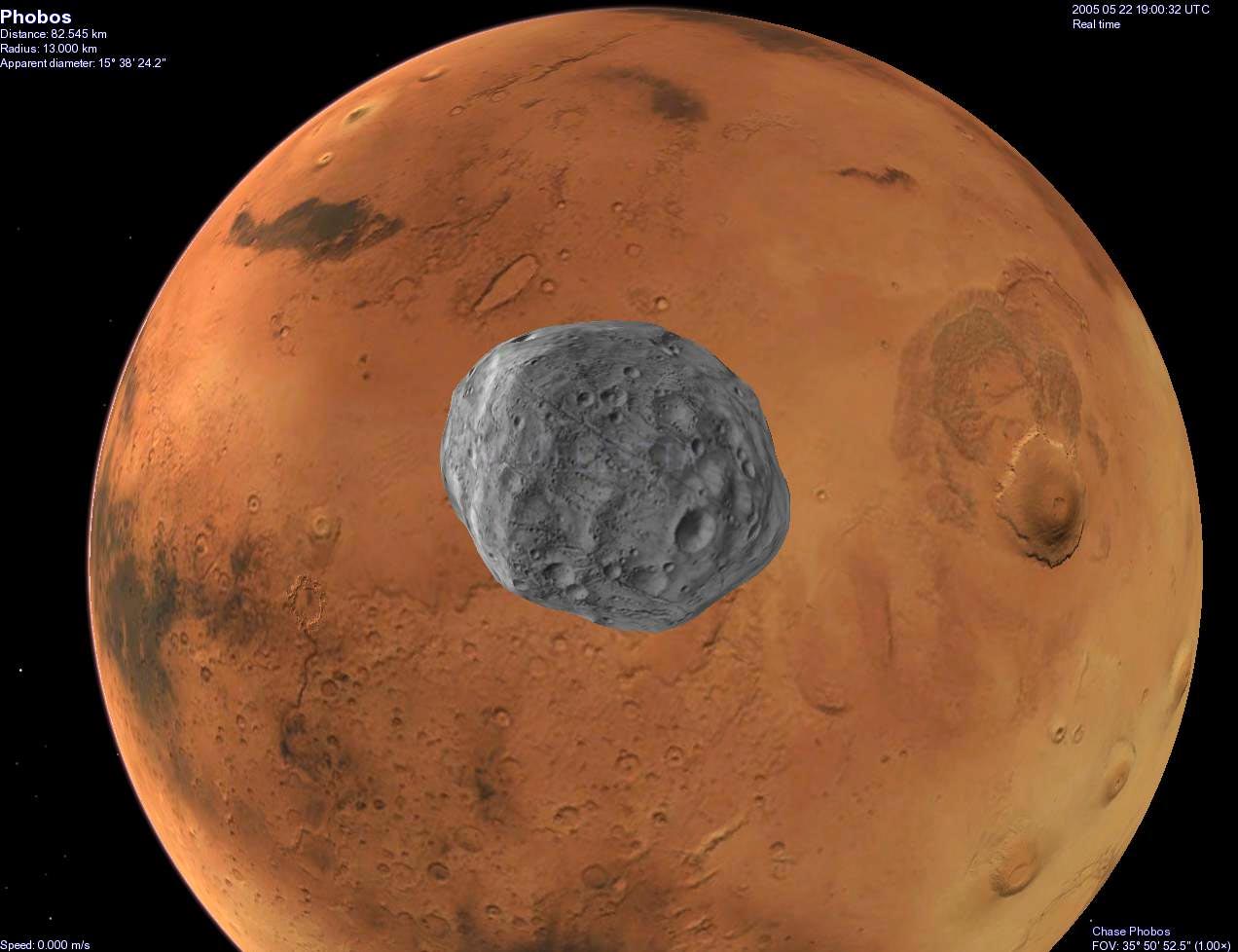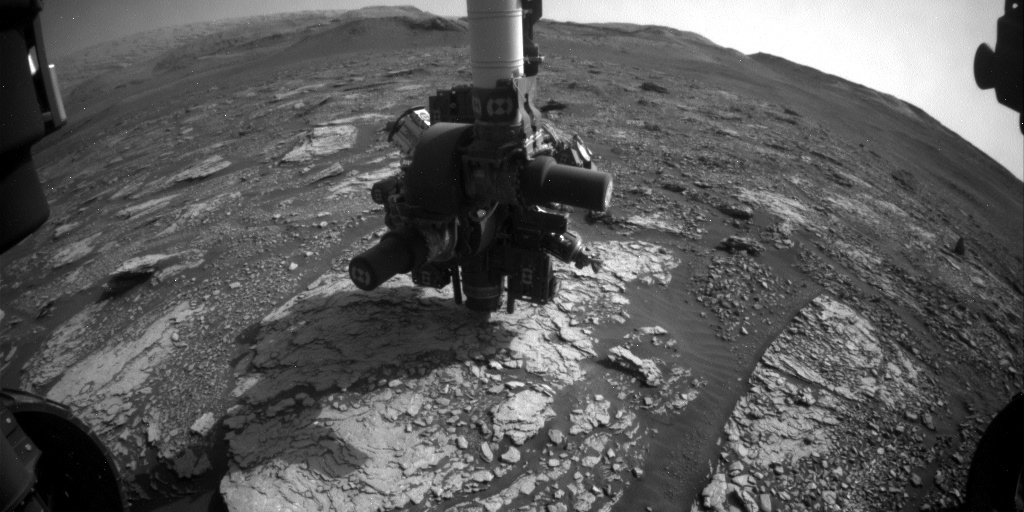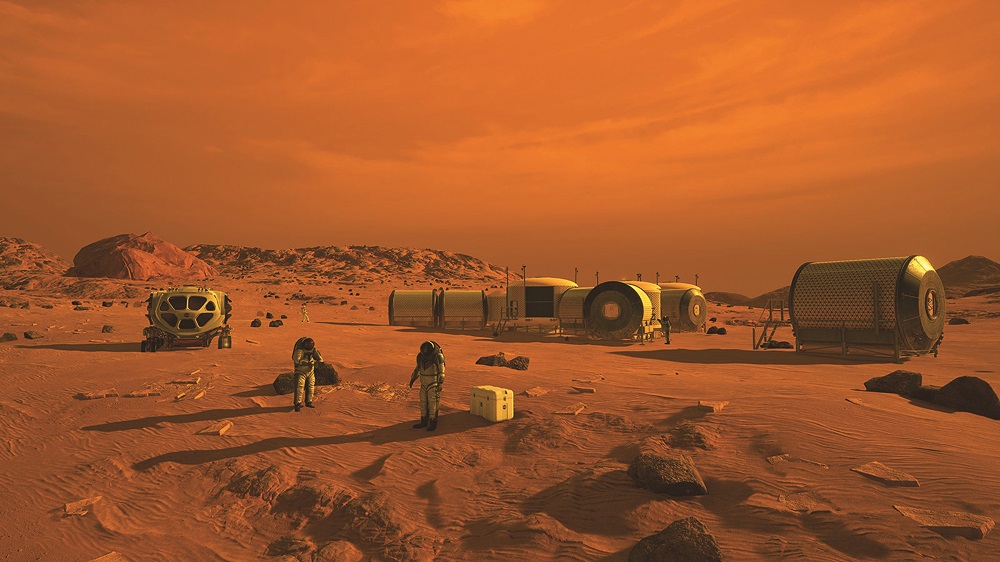
Test Rover Moves to Mars Yard: Technicians move an engineering version of the Perseverance Mars rover into to its new home in the Mars Yard, part of NASA's Jet Propulsion Laboratory in Southern California. Full image & caption ›
Did you know NASA's next Mars rover has a nearly identical sibling on Earth for testing? Even better, it's about to roll for the first time through a replica Martian landscape.
A full-scale engineering version of the Mars 2020 Perseverance rover – outfitted with wheels, cameras, and powerful computers to help it drive autonomously – has just moved into its garage home at NASA's Jet Propulsion Laboratory in Southern California. This rover model passed its first driving test in a relatively tame warehouselike assembly room at JPL on Sept. 1.
Were you following this:
Surprise on Mars – Unexpected Reaction to Solar Eclipses From Martian Moon Phobos

Provides for local solar eclipses: The moon Phobos orbits Mars. Graphic: jihemD/Wikimedia Commons/ CC BY-SA 3.0
An observer standing on Mars would see the planet’s moon Phobos cross the sky from west to east every five hours. Its orbit passes between the sun and any given point on Mars about once each Earth year. Each time it does so, it causes from one to seven solar eclipses within the space of three days. One place where this happens is the site of NASA’s InSight lander, stationed in the Elysium Planitia region since November 2018.
Sols 2872-2873: A New Hole on Mars! – NASA's Mars Exploration Program

Curiosity successfully drilled into the rock target named “Mary Anning 3,” producing a beautiful new drill hole and associated drill tailings. Over the next several days, the team will command the rover to deliver the drilled sample powder into the different instruments onboard the rover for additional analyses. The rover will also continue its investigation of nearby rock targets that have shown interesting chemical variability over relatively short distances.
These blog updates are provided by self-selected Mars Science Laboratory mission team members who love to share what Curiosity is doing with the public.
Report sees ways Artemis supports sustainable human Mars exploration - SpaceNews

WASHINGTON — NASA's Artemis program of human lunar exploration can help pave the way for human Mars missions, according to a new report, although some tweaks to those plans may be required.
The report , released by the space exploration advocacy group Explore Mars during its virtual Humans to Mars Summit, is based on a workshop held last November that brought together representatives of NASA, industry and academia to explore approaches for affordable human exploration of Mars.
Quite a lot has been going on:
NASA baffled by mysterious ridges on Mars
NASA has spent years observing and exploring Mars, but the Mars Reconnaissance Orbiter took a picture of a ridged portion of the Martian surface last month that is “puzzling” to researchers.
The image, taken by the HiRise Context camera, was enhanced with color to help correlate rock units, but that has left more questions than answers about the area known as Aureum Chaos.
The team at the University of Arizona, which operates the HiRise camera, offered a suggestion for how the area formed.
Mars & Moon Conjunction September 2020: How to See Them in the Night Sky - Thrillist
Mars will rise around 10pm ET, depending on your location, in the eastern sky. But shortly after midnight, it will have moved further south and will have a close encounter with the moon in the early hours of Sunday, September 6, on the East Coast. The fourth planet from the sun will have a conjunction with the moon that night, meaning you're going to see these two get nice and cozy in the sky.
Mars and the moon will almost be on top of each other. In some parts of the world, Mars will even be seen to disappear behind the moon and reappear on the other side. This is a lunar occultation, but you'll need to be in southern Europe, South America, or western Africa to see the occultation. It will not be visible from the United States.
Happening on Twitter
A reason for optimism. Did you know our Perseverance Mars rover has a twin on Earth? As @NASAPersevere continues it… https://t.co/VHrxbhdQuf NASAMars (from Fourth Planet From the Sun) Fri Sep 04 22:38:02 +0000 2020
"We have these companies that are building landers, but we need to be able to train our crews," says @Astro_Wheels.… https://t.co/9urS0VcoaF NASA Fri Aug 28 21:54:01 +0000 2020
After spending 178 days in space, @Astro_Wheels is helping to evaluate the tools that will train @NASA's Moon-bound… https://t.co/t606vHax7j NASA_Marshall (from Huntsville, Alabama USA) Mon Aug 31 18:53:00 +0000 2020

No comments:
Post a Comment